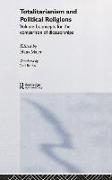Totalitarianism and Political Religions, Volume 1
BücherAngebote / Angebote:
We are used to distinguishing the despotic regimes of the twentieth century -- Communism, Fascism, Nat ional Socialism, Maoism -- very precisely according to place and time, origins and influences. But what should we call that which they have in common? On this question, there has been and remains a passionate debate. Indeed, the question seemed for a long time not even to be admissible. Clearly, this state of affairs is unsatisfactory. The debate has been renewed in the past few years. After the collapse of the Communist systems in Central, East and Southern Europe, a -- scarcely surveyable -- mass of archival material has become available. Following the lead of Fascism and National Socialism, communist and socialist regimes throughout the world now belong to the historical past as well. This leads to the resumption of old questions: what place do the modern despotisms assume in the history of the twentieth century? What is their relation to one another? Should they be captured using traditional concepts -- autocracy, tyranny, despotism, dictatorship -- or are new concepts required? This book documents the first international conference on this theme, a conference that took place in September of 1994 at the University of Munich. The book shows how new models by which to understand political history arose from the experience of modern despotic regimes. Here, the most important concepts -- totalitarianism and political religions -- are discussed and tested in terms of their usefulness.
Lieferbar in ca. 10-20 Arbeitstagen




